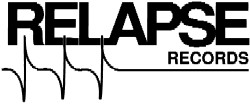
http://www.kindamuzik.net
ernaast
Onze laatste liverecensie.
Onze laatste albumrecensie.
Ons laatste interview.
Onze laatste video.
RELAPSE: a reputation for diversity and quality
Contrary to the genre's conservative image, interesting stuff often happens in metal first. And currently, all interesting stuff in metal seems to becoming from bands signed to Relapse. So we mailed some questions to Matt Jacobson, founder of the label of bands such as Nile, Neurosis, the Dillinger Escape Plan, and Mastodon.
Tekst: Martÿn ter Haar
Publicatiedatum: 28 oktober 2002
 What in short is the history of Relapse? How did it come
about?
What in short is the history of Relapse? How did it come
about?
"Relapse started in 1990 as a hobby. I was 18 years old, and I released a 7"
EP of my friend's hardcore band. I had to start Relapse, as I wanted to be
involved in music. Before Relapse I was big into the tape trading scene, I
did a fanzine, and I made shirts and stickers for bands. I was involved in
anyway I could be..."
Can you explain what the name stands for?
"The name doesn't stand for anything, really. It was just that I like the
way
it sounded, it had a nice ring to it — Relapse records. Also, I like that
it didn't limit us to a certain kind of music, not like 'metal for your
head records' or something."
How would you describe the Relapse sound? What are the qualities you look
for when signing artists to the label?
"Well, the Relapse sound is tough to nail down. I think we have a big mix
of
bands on the label. We have developed a reputation for diversity
and quality. I do think that nearly all of our bands do have certain
characteristics, such as they are the very best at what they do, the cream
of the crop for the genre or sub-genre they come from, they may be a little
left-of-center or a little weird. They also are sometimes tough to
label, and that usually means they are doing something new or fresh."
There's also the Release and the
new Desolation House sub-labels. Why those sub-labels?
"We have created sub-labels for different styles of music outside of metal
and rock. With Release, we put out bands from ambient to dark-edged post-pop
and
electronic stuff, and with Desolation House we are putting out some
death-industrial- and dark-ambient-type stuff. The Desolation House stuff is all
strictly limited edition."
-1002.jpg) What does a typical day at Relapse Central look like?
What does a typical day at Relapse Central look like?
"Hmmm, the day starts at about 9:30, start checking email. At 10:00 we have
our daily label meeting . . . normally lasts an hour. From there, it is non-stop
emails, phone calls, meetings,
paperwork. Some stress, lots to do all the time."
The internet is rapidly changing the way people consume and listen to
music. How important is this new technology to you, and do you have any
plans to use this medium in different ways?
"It is very important to me and to Relapse. It is changing our world so
quickly. We are using it in the standard ways: get info out via our
website, offer MP3 and other sound samples. In the future, someday, I am
sure that digital transmissions will be most of our business, but who
knows when that may become a reality."
The label has its own e-store. How important is that?
"Our e-store is very important, not only for the Relapse releases but also
for the thousands of other items we carry and sell: CDs, T-shirts, videos,
books, etc. We plan to launch a new and improved e-store later this year!"
What does the future hold for Relapse?
"Man, on one hand, too much to list here; on the other, who knows . . . only
time
will tell!"
http://www.kindamuzik.net/interview/relapse/relapse-a-reputation-for-diversity-and-quality/1989/
Meer Relapse op KindaMuzik: http://www.kindamuzik.net/artiest/relapse








Deel dit artikel: